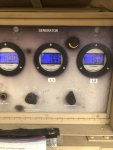Chainbreaker
Well-known member
- 1,832
- 2,112
- 113
- Location
- Oregon
Tuesday morning got up and power was out. Went outside & nothing but thick acrid smoke in the air and could barely see an orange sun through smoke and there was black & grey ash coming down like light snow!
Edit: Here's a picture from my phone I took of sky/sun this morning. Very eerie to say the least!

The reason for our local rural power outage is because our Utility Company around midnight Monday decided to shut down power pre-emptively due to high winds & low humidity in our area during RED alert fire conditions. Unfortunately, the Blue River fire (aka the "Holiday Farm Fire" about 40 miles east of us) blew up overnight due to high winds & destroyed 100 buildings. News said to expect loss of life in that fast moving fire.
So, I fired up my #1 generator and life was "almost normal" considering the fire situation, and we were able to watch local news to keep tabs on the fires around us. However, about 5 hours later all of a sudden when I was outside about 75' away I heard gen #1 just quit like it was purposely shut down. Not a good sign! I went over and checked fuel, oil, batteries and all were good. I made a decision that since I have my backup generator #2 parked next to it I would now use it rather than trying to diagnose the problem on genset #1 and not have the house powered up. We really needed to be able to keep tabs on local news reports on area fast moving fires in these high wind low humidity conditions.
Once I got Gen #2 up & running and the house back online, I tried to start Gen #1 and it started right up but quit approximately 10 seconds later...hmmm. I then decided to try a 2nd start, so I could observe oil pressure and the stop solenoid as I expected genset to fail again. However, this time it started right up and proceeded to run 15+ minutes straight & might have run longer if I allowed it to run longer. Since I had house back online now using gen #2, next priority was to go down to barn to start #3 generator. We needed to fill up horse water using our 2nd well on separate electrical service entrance. Thankfully, #3 Genset started right up and has been running well all day keeping the horses & wife happy.
Unfortunately, due to more pressing matters I could not get back to troubleshooting gen #2 today as friends living 25 miles east of us had to evacuate their horses off their property and bring them over to our property which "for now" is a safe haven.
When I get some time I plan to get back to gen #1 to do some more troubleshooting.
Anyway, I experienced the 2 is 1, 1 is none rule firsthand. I feel fortunate that I chose to invest in having redundant backup gensets ready to roll!
Edit: Here's a picture from my phone I took of sky/sun this morning. Very eerie to say the least!

The reason for our local rural power outage is because our Utility Company around midnight Monday decided to shut down power pre-emptively due to high winds & low humidity in our area during RED alert fire conditions. Unfortunately, the Blue River fire (aka the "Holiday Farm Fire" about 40 miles east of us) blew up overnight due to high winds & destroyed 100 buildings. News said to expect loss of life in that fast moving fire.
So, I fired up my #1 generator and life was "almost normal" considering the fire situation, and we were able to watch local news to keep tabs on the fires around us. However, about 5 hours later all of a sudden when I was outside about 75' away I heard gen #1 just quit like it was purposely shut down. Not a good sign! I went over and checked fuel, oil, batteries and all were good. I made a decision that since I have my backup generator #2 parked next to it I would now use it rather than trying to diagnose the problem on genset #1 and not have the house powered up. We really needed to be able to keep tabs on local news reports on area fast moving fires in these high wind low humidity conditions.
Once I got Gen #2 up & running and the house back online, I tried to start Gen #1 and it started right up but quit approximately 10 seconds later...hmmm. I then decided to try a 2nd start, so I could observe oil pressure and the stop solenoid as I expected genset to fail again. However, this time it started right up and proceeded to run 15+ minutes straight & might have run longer if I allowed it to run longer. Since I had house back online now using gen #2, next priority was to go down to barn to start #3 generator. We needed to fill up horse water using our 2nd well on separate electrical service entrance. Thankfully, #3 Genset started right up and has been running well all day keeping the horses & wife happy.
Unfortunately, due to more pressing matters I could not get back to troubleshooting gen #2 today as friends living 25 miles east of us had to evacuate their horses off their property and bring them over to our property which "for now" is a safe haven.
When I get some time I plan to get back to gen #1 to do some more troubleshooting.
Anyway, I experienced the 2 is 1, 1 is none rule firsthand. I feel fortunate that I chose to invest in having redundant backup gensets ready to roll!
Last edited:


